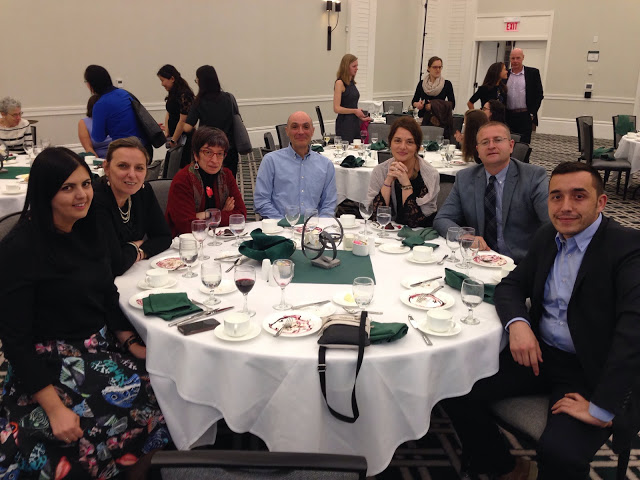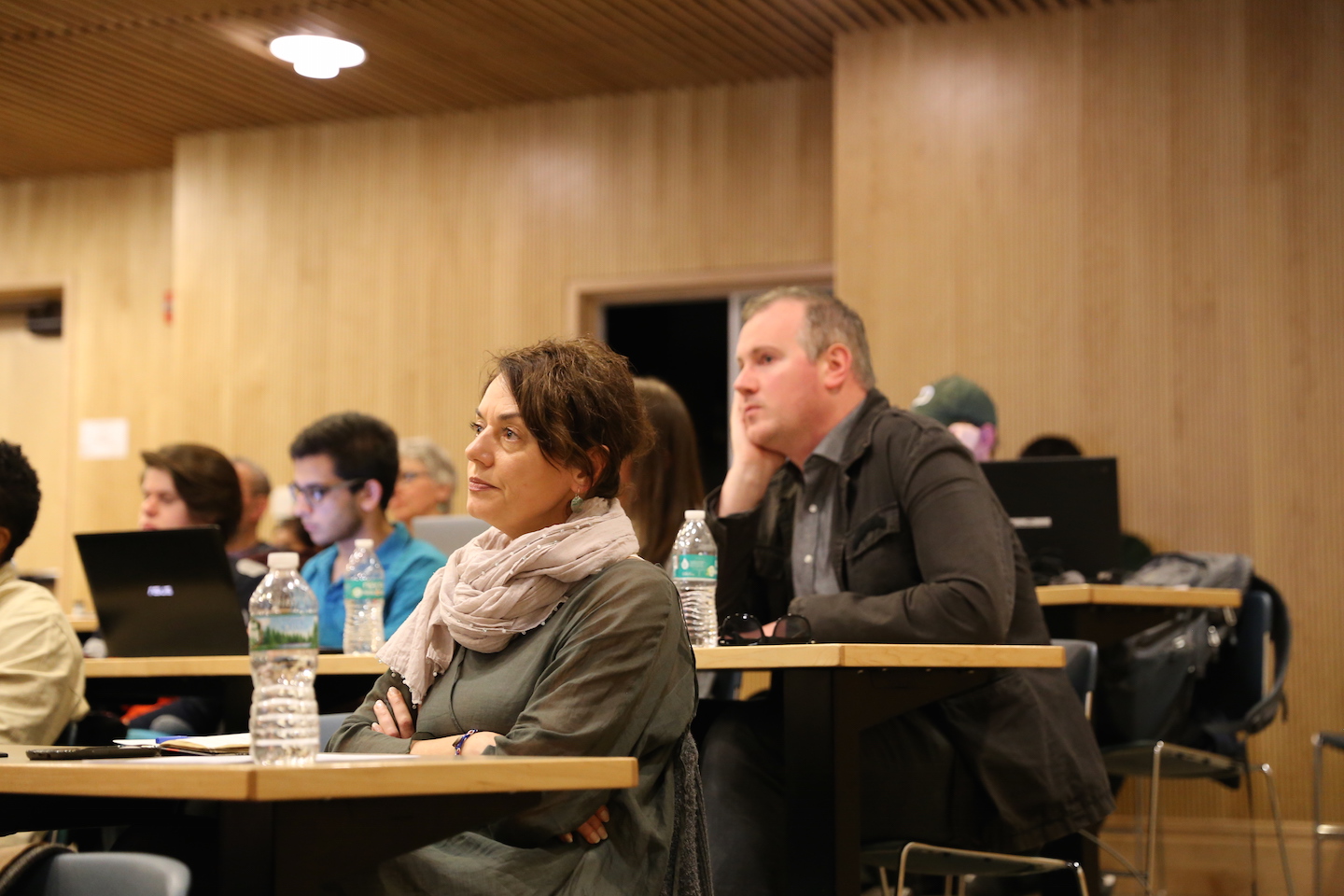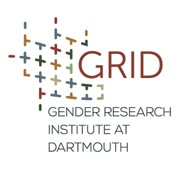Kosovo Scholars Collaborate with GRID
Two prominent female scholars from Kosovo came to Dartmouth in spring 2016 to collaborate with the Gender Research Institute through the Transformational Leadership Program sponsored by USAID. They participated in the 2016 GRID Seminar "Gender Matters: Feminist Ontologies and Materialisms."
 Dr. Vjollca Krasniqi is an Assistant Professor at the Faculty of Philosophy, University of Prishtina and she is the co-chair of the University Program for Gender Studies and Research. She holds a Ph.D. degree from the University of Ljubljana, an MSc degree in Gender, Development and Globalization from the London School of Economics, and a BA degree in Philosophy and Sociology from the University of Prishtina. She has written on political, social, and gender developments in the Balkans, transnationalism, war, and globalization. Her research interests are gender, nation and collective memory, postwar reconstruction and post-war justice, and social policy. Her recent publications include "Aging in a Young Nation and New State: Social Divisions and Neglect across Cultures" (2015); "Beyond the Incomplete: Dynamics of Social Change in Kosovo" (2015); "Disability, Politics and Culture in Kosovo" (2014); "The Topography of the Construction of the Nation in Kosovo" (2014); and "Another Report on the Banality of Evil: The Cultural Politics of the Milošević Trial in Kosovo" (2013). She has also been active in the women's movement in the Balkans and organized/participated in a number of international conferences on political and gender issues.
Dr. Vjollca Krasniqi is an Assistant Professor at the Faculty of Philosophy, University of Prishtina and she is the co-chair of the University Program for Gender Studies and Research. She holds a Ph.D. degree from the University of Ljubljana, an MSc degree in Gender, Development and Globalization from the London School of Economics, and a BA degree in Philosophy and Sociology from the University of Prishtina. She has written on political, social, and gender developments in the Balkans, transnationalism, war, and globalization. Her research interests are gender, nation and collective memory, postwar reconstruction and post-war justice, and social policy. Her recent publications include "Aging in a Young Nation and New State: Social Divisions and Neglect across Cultures" (2015); "Beyond the Incomplete: Dynamics of Social Change in Kosovo" (2015); "Disability, Politics and Culture in Kosovo" (2014); "The Topography of the Construction of the Nation in Kosovo" (2014); and "Another Report on the Banality of Evil: The Cultural Politics of the Milošević Trial in Kosovo" (2013). She has also been active in the women's movement in the Balkans and organized/participated in a number of international conferences on political and gender issues.
 Dr. Hasnije Ilazi is the Head of the Department of Philosophy at the Univeristy of Prishtina and the President of the Kosovo Philosophical Association. She is also the Acting Director of the Institute for Social Sciences and Humanities (ISSH) at the University of Prishtina. Her academic work includes numerous publications, presentations, conferences, seminars and other research activities through which she significantly contributed to the field of social science research, public policy development and gender studies. Currently she is the editor of the scientific journal "Njohja" and member of editorial Board of the philosophical journal "Agora".
Dr. Hasnije Ilazi is the Head of the Department of Philosophy at the Univeristy of Prishtina and the President of the Kosovo Philosophical Association. She is also the Acting Director of the Institute for Social Sciences and Humanities (ISSH) at the University of Prishtina. Her academic work includes numerous publications, presentations, conferences, seminars and other research activities through which she significantly contributed to the field of social science research, public policy development and gender studies. Currently she is the editor of the scientific journal "Njohja" and member of editorial Board of the philosophical journal "Agora".
 Both scholars took part in the 2016 GRID Seminar "Gender Matters: Feminist Ontologies and Materialisms." They recount their seminar experience as illuminating in their future research. Dr. Krasniqi noted how the seminar focuses on the notion of 'nature' as a material world and symbolic concept to encompass the consequences of environmental destruction, economic exploitation, warfare and injustice at both macro and micro levels. She connected her own research with the seminar's theme: "In my research I have focused on the gender implications of trans-nationalism, war, development, and globalization. I am aware of the need of local histories, and Kosovo's potential to provide such history due to the dramatic events that have shaped Kosovo in the past as well as its history in the present time. Drawing on the seminar's epistemological stance and approaches--feminist theory, anti-racist, and social justice--I would like to map out Kosovo's experiences of post-war reconstruction and political and social development. In this research, I seek to understand the relations between ideology, class, nation, sexuality and gender, to obtain sound geographical and comprehensive cultural definitions and historically informed explanations of war, post-war reconstruction, international protectorate, and state-building." Dr. Ilazi also noted how pivotal her experience at GRID and her new contacts from Dartmouth will be in her future research. She highlighted how particularly relevant the first three events of the seminar (Animting Entanglements, Archipelagic Entanglements, and Onto-Epistemological Entanglements) to her research. She commented that it was a very "rare opportunity to think and discuss in a multidimensional manner on the issue of biopolitics, anthropology, ecology, humanities, and gender."
Both scholars took part in the 2016 GRID Seminar "Gender Matters: Feminist Ontologies and Materialisms." They recount their seminar experience as illuminating in their future research. Dr. Krasniqi noted how the seminar focuses on the notion of 'nature' as a material world and symbolic concept to encompass the consequences of environmental destruction, economic exploitation, warfare and injustice at both macro and micro levels. She connected her own research with the seminar's theme: "In my research I have focused on the gender implications of trans-nationalism, war, development, and globalization. I am aware of the need of local histories, and Kosovo's potential to provide such history due to the dramatic events that have shaped Kosovo in the past as well as its history in the present time. Drawing on the seminar's epistemological stance and approaches--feminist theory, anti-racist, and social justice--I would like to map out Kosovo's experiences of post-war reconstruction and political and social development. In this research, I seek to understand the relations between ideology, class, nation, sexuality and gender, to obtain sound geographical and comprehensive cultural definitions and historically informed explanations of war, post-war reconstruction, international protectorate, and state-building." Dr. Ilazi also noted how pivotal her experience at GRID and her new contacts from Dartmouth will be in her future research. She highlighted how particularly relevant the first three events of the seminar (Animting Entanglements, Archipelagic Entanglements, and Onto-Epistemological Entanglements) to her research. She commented that it was a very "rare opportunity to think and discuss in a multidimensional manner on the issue of biopolitics, anthropology, ecology, humanities, and gender."
 Building on such collaborative experiences and continuing relationship, GRID and the University of Prishtina Gender Studies and Research (UPGSR) are in conversation with each other as sister programs. As Dr. Krasniqi commented, "(T) he cooperation over the years on gender studies as a discipline and gendering of the respective institutions have made this a truly transnational experience of mutual learning, solidarity and understanding. I believe this to be the foregrounding of sisterhood at a transnational level." She highly praised the GRID seminar as "a site of connectivity of scholars and ideas engaging on a wide range of theories deconstructing fractured ontologies and epistemologies of being and knowledge production. Its philosophy, however, rests on the politics of knowledge produced in a culture of communal sharing and solidarity." Dr. Ilazi specifically highlighted her personal gratitude for Director Martín's warm hospitality and support. She expressed that the leadership at GRID inspires her personally and professionally.
Building on such collaborative experiences and continuing relationship, GRID and the University of Prishtina Gender Studies and Research (UPGSR) are in conversation with each other as sister programs. As Dr. Krasniqi commented, "(T) he cooperation over the years on gender studies as a discipline and gendering of the respective institutions have made this a truly transnational experience of mutual learning, solidarity and understanding. I believe this to be the foregrounding of sisterhood at a transnational level." She highly praised the GRID seminar as "a site of connectivity of scholars and ideas engaging on a wide range of theories deconstructing fractured ontologies and epistemologies of being and knowledge production. Its philosophy, however, rests on the politics of knowledge produced in a culture of communal sharing and solidarity." Dr. Ilazi specifically highlighted her personal gratitude for Director Martín's warm hospitality and support. She expressed that the leadership at GRID inspires her personally and professionally.

